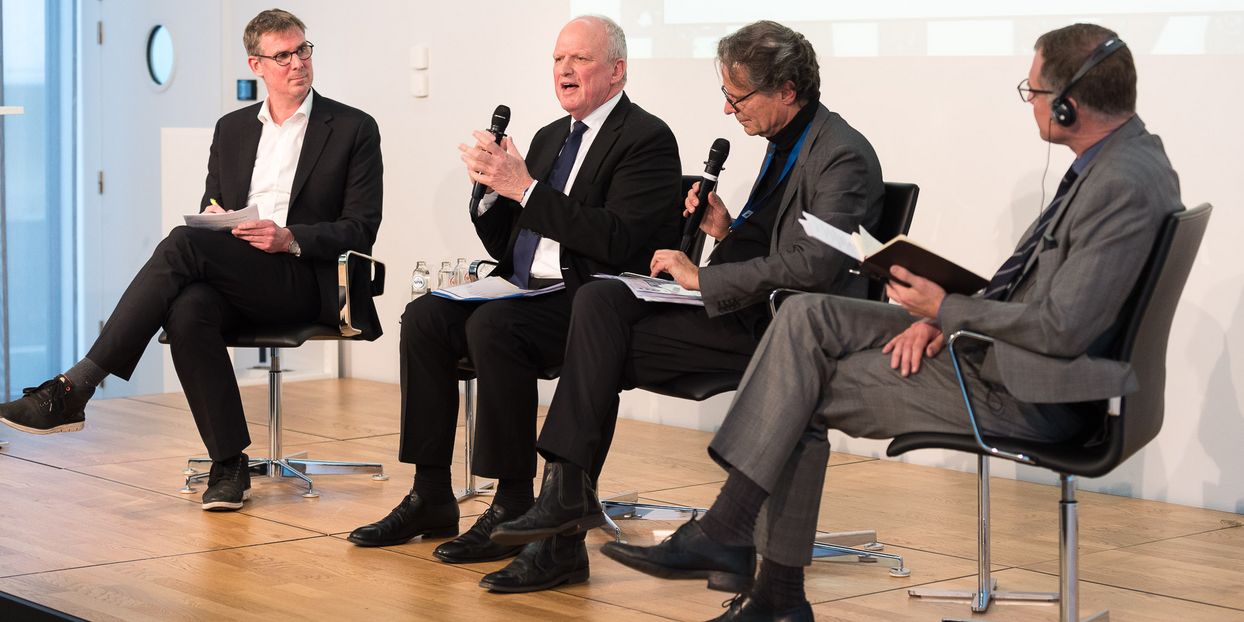
Gipfelnächte in Europa: Die Krise als Entscheidungsmodus
Crisis Talk of 13 November 2019
European policy often presents itself to the citizens as crisis policy. At the end of long nights of debates about decisions, those responsible appear before the press and announce a long-awaited agreement. Mark Weinmeister (Hessian Secretary of State for European Affairs), who welcomed the guests of this 13th Crisis Talk at the Representation of the State of Hesse in Brussels, referred to this recurring choreography and raised the question whether this nightly wrangling is not only a committed but also a sustainable mode of politics. The moderator Ralph Sina (WDR/NDR) took up this point when he admitted that this was not only, but also a media phenomenon. Another problem of crisis summits is that they bind the forces of the press in such a way that, beyond their reporting, the presentation of normal political processes in Brussels is often neglected.
This was the context in which the experts Prof. Dr. Oliver Ibert (Director of the Leibniz Institute for Research on Society and Space), Prof. Dr. Mark Rhinard (Stockholm University) and Dr. Carsten Pillath (Director General, Council of the European Union) subsequently discussed the summit nights in Europe. Carsten Pillath initially noted that the summit nights were usually not perceived by the participants themselves as decision-making in crisis mode. In Europe, every government has its say, which takes time, and sometimes later in the night, until an agreement is reached. This is clear to all those involved and does not mean that an agreement is fundamentally in danger. However, Pillath's further comments on his personal experiences from such decision-making situations - for example in the context of the Greek financial crisis - suggested that so much understatement is not always present and that it can be moments that research describes as crisis-like.
The perspective of crisis research was outlined by Oliver Ibert in a keynote speech, which outlined both characteristic temporal courses of crises and their political, factual and spatial embedding. Based on this academic framework, Ibert made it clear that a crisis dynamic is not only derived from a real problem. The perception of the actors that it is a crisis must also be added. Only then will decisions become possible that possibly break with previous political practices and with which a new direction can be taken. If all this comes together, then crises are situations in which innovations are possible that can go beyond a return to "normal" politics. Mark Rhinard supplemented this with his research focused on Europe and made it clear that a mode of making collective decisions under the conditions of crisis described above - in his publications he also writes of "crisification" - is characteristic of Europe in particular.
This led back to the beginning of the event. Prof. Dr. Nicole Deitelhoff, who spoke introductory words for the Leibniz Research Alliance "Crises of a Globalized World", referred to the term "permanent crisis" or "poly-crisis", which shows, especially with regard to Europe, that after the crisis is always also before the next crisis and the question arises as to how this will affect the European institutions in the long term. For even if, with reference to Carsten Pillath, it is primarily a perception of the press and the public, and only to a limited extent a perception of the actors involved, this perception has real consequences for the political process, as Oliver Ibert underlined, which require reflection.
The Crisis Talk "Summit Nights in Europe" could only raise these questions and not answer them. Nevertheless, it offered plenty of points of reference for the numerous listeners from academia and practice who attended the talk. The organisers - the Leibniz Research Alliance "Crises of a Globalised World", the Representation of the State of Hesse to the EU, the Research Alliance "Normative Orders" and the European Office of the Leibniz Association - were delighted that political Brussels showed great interest in a crisis topic at this last talk of the series in 2019.
